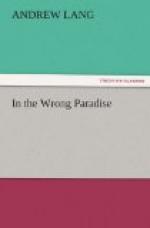We slipped into the silent town, unwalled and unguarded as it was, for as one of their own poets had said, “We dwell by the wash of the waves, far off from toilsome men, and with us are no folk conversant.” They were a race that knew war only by a vague tradition, that they had dwelt, at some former age, in an island, perhaps New Zealand, where they were subject to constant annoyance from Giants,—a likely story. Thence they had migrated to their present home, where only one white man had ever been cast away—one Odysseus, so their traditions declared—before our arrival. Him, however, they had treated hospitably, very unlike their contemplated behaviour to Bludger and me.
I am obliged to make this historical digression that the reader may understand how it happened, under Providence, that we were not detected in passing through the town, and how Bludger successfully accomplished what, I fear, was by no means his first burglary.
We parted at the chief’s house, Bill to secure provisions, and I to unmoor a boat, and bring her round to a lonely bay on the coast, where my companion was to join me.
I accomplished my task without the slightest difficulty, selected a light craft,—they did not use canoes, but rowed boats like coracles,—and was lying at anchor, moored with a heavy stone, in the bay.
The dawn was now breaking in the most beautiful colours—gold, purple, crimson, and green—across the sea. All nature was still, save for the first pipe of awakening birds.
There was a delicate fragrance in the air, which was at once soft and keen, and, as I watched the red sunlight on the high cliffs, and on the smooth trunks of the palm trees, I felt, strange to say, a kind of reluctance to leave the island.
The people, apart from their cruel and abominable religion, were the gentlest and most peaceful I have ever known. They were beautiful to look upon, so finely made and shapely that I have never seen their like. Their language was exquisitely sweet and melodious, and though, except hymns, I do not care for poetry, yet I must admit that some of their compositions in verse were extremely pleasing, though they were ignorant of the art of rhyme. All about them was beautifully made, and they were ignorant of poverty. I never saw a beggar on the island; and Christians, unhappily, do not share their goods with each other, and with the poor, so freely as did these benighted heathens. Often have I laboured to make them understand what our Pauper Question means, but they could not comprehend me.
“How can a man lack home, and food, and fire?” they would say; “do people not love each other in your country?”
I explained that we love each other as Christians, but this did not seem to enlighten their benighted minds. On the other hand, it is true that they settle their population question by strangling or exposing the majority of their infant daughters.




